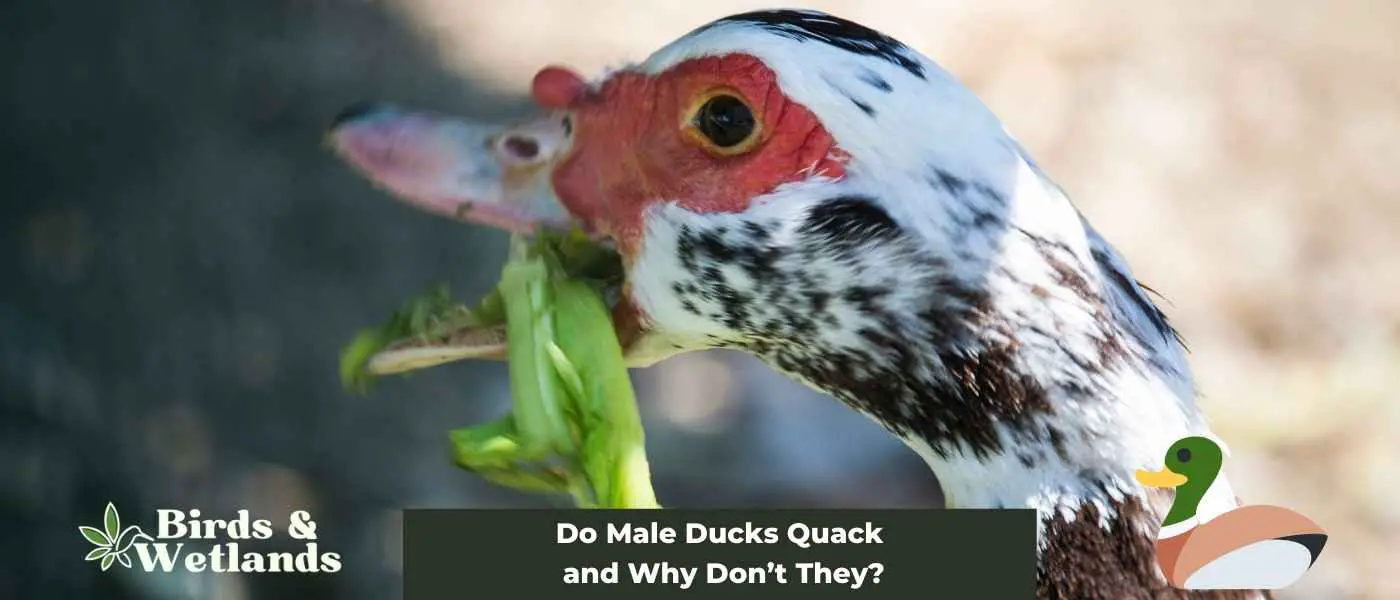Cilantro is a flavorful herb commonly used in various dishes, but as a duck owner, you may be wondering whether it’s safe to add this herb to your feathered friend’s diet.
We’ll take a closer look at whether cilantro is a healthy and nutritious addition to a duck’s diet, as well as explore any potential risks or concerns associated with feeding cilantro to ducks.
But can ducks eat cilantro?
Yes, ducks can eat cilantro (coriander) as it is a safe and nutritious food option. Cilantro is rich in vitamins, minerals, and antioxidants, which can contribute to a duck’s overall health. However, offer cilantro in moderation and chop it into small pieces for easier consumption.
Key Takeaways on Can Ducks Eat Cilantro
Ducks can eat cilantro. Fresh herbs can be a good part of their diet but any herb should be given in moderation.
Cilantro is a good source of vitamins A and K, iron, magnesium, antioxidants and essential oils. It also contains small amounts of calcium, phosphorus, and potassium.
Duck owners can use cilantro as a supplement to commercial duck feed but not a staple of their ducks’ diet.
Is Cilantro Poisonous to Ducks?
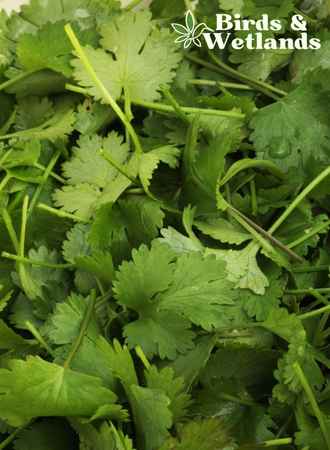
Cilantro is not poisonous and doesn’t contain any toxic substances. In fact, cilantro can provide them with essential nutrients.
However, it is important to remember that not all plants are safe for ducks to eat. Toxins in some plants can be harmful to ducks, so it is always best to err on the side of caution and avoid feeding them any plants you are unsure about. To be certain and to prevent food poisoning, research the plant online or consult a local plant expert.
Can Baby Ducks Eat Cilantro?
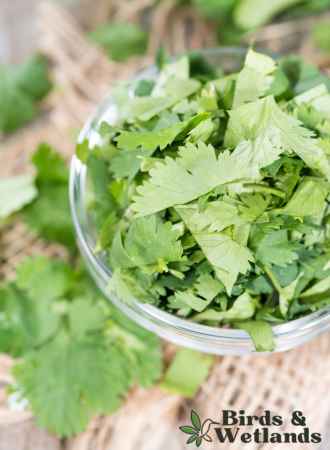
Yes, baby ducks or ducklings can eat cilantro. However, there are a few things to keep in mind before feeding them to your young ducks.
Cilantro is a fairly strong herb, so feed it to ducklings when they are around eight weeks old, and their digestive system can handle it.
Moreover, cilantro can be a choking hazard if not cut into small bite-sized pieces. When feeding cilantro to your baby ducklings, make sure the pieces are small enough that they can consume them without choking. You can mix it with their usual formulated starter feed.
Can Ducks Eat Cooked Cilantro?
Cilantro is a popular ingredient in salsa dishes, and many people enjoy its distinct flavor. If you have some cooked cilantro leftovers, you may be wondering if ducks can also enjoy them.
Ducks can eat cooked cilantro but only in moderation. It is important not to overfeed them cilantro and offer this herb as an occasional treat.
Keep in mind that cooking cilantro removes its vitamins and minerals so it is highly recommended to serve this herb fresh. Additionally, anything that contains preservatives, extra salt and is heavily processed can be harmful to your ducks.
Can Ducks Eat Cilantro Leaves?
Adult ducks can eat and digest various foods, and cilantro leaves are no exception. In fact, cilantro leaves can be a healthy and nutritious treat for ducks. Serving chopped cilantro leaves with other treats to ducks is a great way to add some extra nutrition to their diet. Make sure to give them fresh cilantro leaves, as they will not be as interested in eating older or wilted leaves.
Can Ducks Eat Cilantro Stems?
While the cilantro plant’s leaves are widely used as a flavorful addition to many dishes, the stalks can also be enjoyed by ducks. On hot summer days, the stalks make an excellent treat for ducks. They not only provide a refreshing burst of hydration but are also high in nutrients that ducks require to stay healthy. Cilantro stems are a great option if you want to add some variety to your duck’s diet.
Can Ducks Eat Cilantro Seeds?
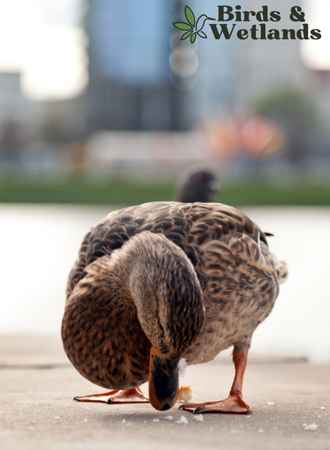
Cilantro seeds can be a good source of nutrients for ducks. The dried seeds are high in protein and fat, as well as a variety of vitamins and minerals. You can feed them to your flock fresh, dried or crushed.
Generally, ducks love feeding on cilantro or coriander seeds and frequently eat them straight from the plant. Coriander seeds are a great choice to provide your ducks with a healthy treat.
What Are the Health Benefits of Feeding Fresh Cilantro to Ducks?
Cilantro is a widely used herb around the world. It adds a distinct fresh citrusy, and pungent taste to salads and other cooked dishes. But many people don’t know that cilantro provides dietary supplements and is packed with vitamins, minerals and nutrients.
Adding cilantro to your ducks’ diet can benefit your feathered friends. This herb contains vitamins A, K and C. It also has various nutrients and minerals such as magnesium, potassium, phosphorus and fiber.
Vitamin A helps ducks keep their skin and feathers healthy. It also plays an important role in their vision. While vitamin C helps boost their immune system.
Vitamin K helps ensure proper blood clotting and bone development. Due to constantly molting and growing new feathers, ducks require a higher level of vitamin K than other animals.
Dietary fiber is an essential part of a healthy diet for ducks. Ducks need dietary fiber to help them digest their food properly, keep their digestive system working properly and allow them to absorb nutrients properly to prevent constipation. So cilantro can be a good supplement for a grain diet.
Ducks need iron for the proper biochemical reactions of their bodies, including hemoglobin production, the molecule that carries oxygen in the blood. In addition, iron plays an important role in metabolism and energy production. Ducks also need iron because it promotes healthy growth and development and general well-being.
How to Serve Cilantro to Ducks
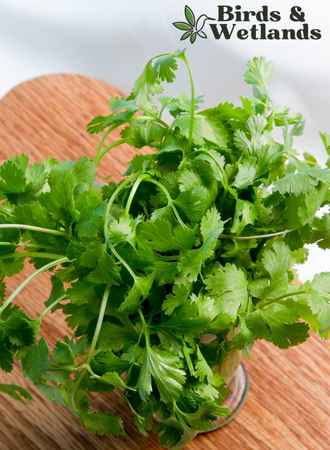
Many ducks enjoy eating cilantro. This herb is nutritious and widely available. It’s not even hard to grow cilantro in your garden because this herb is low maintenance. So if you’re looking for a healthy treat for your flock, consider adding cilantro to their diet.
Here’s how to serve cilantro to your ducks:
Chop both the leaves and stems of the cilantro plant into digestible pieces then put them into your feeder.
You can also serve cilantro leaves with water in a bowl.
You can add chopped cilantro to duck food as an excellent supplement.
You can also add cilantro with other herbs and leafy greens.
Feed cilantro to your young and mature ducks in moderation, not more than twice a week.
Scatter dried cilantro around your duck’s feeding and nesting areas to prevent fungal growth.
While most ducks enjoy cilantro, don’t be alarmed if your flock doesn’t eat this herb. Remember cilantro has a strong flavor.
Other Similar Foods for Ducks
- Can Ducks Eat Mushrooms
- Can Ducks Eat Onions
- Can Ducks Eat Oranges
- Can Ducks Eat Peaches
- Can Ducks Eat Peanut Butter
- Can Ducks Eat Pears
- Can Ducks Eat Pecans
Best Duck Feed Pellets
Are you a duck owner looking for the perfect feed to keep your feathered friends happy and healthy? Look no further than Purina Duck Feed Pellets! With their nutritionally balanced formula and high-quality ingredients, these pellets are the ultimate solution for providing your ducks with the nutrition they need to thrive.
Pros
- Complete Nutrition: Purina Duck Feed Pellets are nutritionally balanced to provide all the essential vitamins and minerals that ducks need to stay healthy and strong.
- Easy to Digest: The pellets are specially formulated to be easy to digest, which makes them ideal for ducks of all ages.
- Promotes Growth and Development: With its balanced nutrition formula, Purina Duck Feed Pellets are designed to support healthy growth and development in ducks.
- Suitable for All Breeds: Whether you have domestic ducks or wild ducks, Purina Duck Feed Pellets are suitable for all breeds of ducks.
- Trusted Quality: Purina has been producing high-quality animal feed for over 100 years, so you can trust that your ducks are getting the best possible nutrition with Purina Duck Feed Pellets.
Cons
- Cost: Compared to other types of duck feed on the market, Purina Duck Feed Pellets can be slightly more expensive. However, many customers feel that the high-quality ingredients and balanced nutrition formula are worth the extra investment.
- Pellet Size: Some customers have noted that the pellet size of Purina Duck Feed Pellets can be quite large, which may not be suitable for smaller or younger ducks. However, many customers have reported that the pellets can easily be broken up or soaked in water to make them easier to eat.

Jim Addison is an avid bird watcher and has been obsessed with the activity since he was a young boy.
He has traveled all over North America in search of new and interesting species to observe, and his detailed knowledge of the subject makes him a sought-after expert on the topic.

